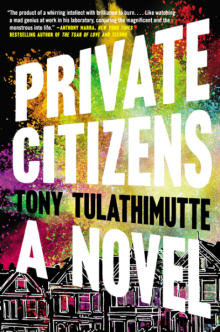 Tony Tulathimutte’s debut novel Private Citizens has pretty lofty aims: the back cover calls it both “a loving satire” and “Middlemarch for Millenials,” the cover design’s slanted all-caps are likely meant to recall the cover of Infinite Jest. How lucky we are, then, that Tulathimutte is talented enough to actually deliver on this promise. This is true in quality of the work, if not style: the massive scale of the two previously mentioned works is not being attempted here, but the generational statement of each is—and it succeeds.
Tony Tulathimutte’s debut novel Private Citizens has pretty lofty aims: the back cover calls it both “a loving satire” and “Middlemarch for Millenials,” the cover design’s slanted all-caps are likely meant to recall the cover of Infinite Jest. How lucky we are, then, that Tulathimutte is talented enough to actually deliver on this promise. This is true in quality of the work, if not style: the massive scale of the two previously mentioned works is not being attempted here, but the generational statement of each is—and it succeeds.
Private Citizens gives us the story of four friends who met at Stanford in the waning years of the Bush administration: Linda, a fiercely brilliant writer and Cool Girl who deemed herself too smart for advanced critical or creative studies on a spite-odyssey through San Francisco’s coke parties; Will, hyper-self-conscious of his Asian-ness and pathologically passive-aggressive; Henrik, a bipolar scientist who overthinks everything to the point of paralysis; and Cori, an intense leftist activist who struggles to live her politics, begrudgingly accepting financial help from her ultra-rich conservative father. They’re privileged, but aware of it, but (correctly) worried they’re not aware enough; they’re progressives trying to survive in neoliberalism, but to them, succeeding conventionally feels kind of rewarding. The story never definitively lionizes nor skewers these characters; instead, it evinces a deep compassion for them while occasionally deflating them with a deserved glee.
The saddest and funniest part of the book sees tech-genius Will spending an absurd uninterrupted full week devising algorithms to map the face of his away-on-business girlfriend onto the faces of women in his several terabytes of painstakingly, spreadsheet-cataloged and tagged pornography, sublimating his annoyance with his girlfriend’s upward career trajectory into copious, eventually bloody masturbation. Many moments like these are beautifully contrasted with things like the quiet loneliness of the flashback to Henrik’s adolescence, spent mostly in the passenger seat of a truck owned by his father, a nomadic radical libertarian. Private Citizens does something that High Literary Fiction seldom deigns to do: these characters are intimately relatable (to the staff and audience of this publication, at least). Not child prodigies or Ennui Men, these are overqualified, underemployed twenty-somethings with complicated relationships to their genders and racial identities, mental illnesses, annoying New Age roommates, apartments covered in empty food containers, and the confusing vacillation between pride and self-hatred that can only come from the constant internal recrimination that defines 21st century selfhood.
But it’s the lack of this worldview in the writing itself that makes Private Citizens so impressive. Tulathimutte has the cleverness of a Foster Wallace but not a trace of the logorrheic anxiety about conveying information. This is about as assured a novel as you are likely to ever read, and it’s not at all shy about letting you know this either: take this paragraph from one of Linda’s chapters:
“Contemporary writers were so shit-scared of moralizing that they delegated to their poor characters the responsibility for conveying their philosophies through indirect discourse, the indeterminate ironies of narrative distance, constraining writers from delivering the grand true-eyed pronouncements of Tolstoy or Proust. Writers had capitulated to the camera lens. Postmodern author-surrogates and clairvoyant first-persons were just Band-Aids on a fault line. We needed a return to omniscience.”
This is practically the book’s mission statement. Its characters enact the quintessentially millennial experience, while, in contrast, the style and the narrative argue a way forward from the stultifying Droste-effect minefield of equivocation that is contemporary consciousness. There are several ruthlessly unsubtle events in the story that are never going to feel “earned” or “organic” in the parlance of the writing style the previous quotation inveighs against: someone gets hit by a car and another has to have their eyes surgically removed, for instance. Characters, Linda and Will especially, can feel like they’re transparently voicing Tulathimutte’s opinions without regard to the action. But the genius of Private Citizens is this: not only are these overtly didactic choices permissible in fiction, this kind of directness is the salvation of the real-life people it’s about.
At one point, Linda invokes The Wire as the television show that killed the social novel, which is, of course, the genre in which Private Citizens operates. The Wire’s creator David Simon often described his show as a Greek tragedy populated by modern characters, a story where the fates (played by institutions) are indifferent to the efforts of people who believe too strongly in the power of the individual. Private Citizens, then, is about the people who watched The Wire and agreed that they were powerless. They turned to look for a way to combat the ambivalence, equivocation, and retreat caused by the awareness of the incomprehensible informational sprawl of how “everything happens so much,” as spambot-turned-art-project horse ebooks once tweeted. If metanarrative has been reduced to fragmented parts by modern life, Private Citizens’ compassion and its confidence in the bold gesture tells us that we can and should reassemble those parts into a truer whole, rather than taking a weak solace in resigned nihilism and ironic detachment.
The novel Private Citizens (384 pages) by Tony Tulathimutte is available from William Morrow Paperbacks, a division of HarperCollins (February, 2016).
Tim Jones is a Ph.D student in the English department at LSU. He holds a Master’s in Popular Culture from Bowling Green State University and is from Ocean Springs, Mississippi. Follow him on Twitter at @cutebuttsaga.